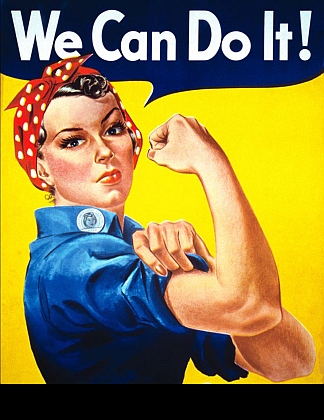Concert Review
Sacramento Women's Chorus
We Can Do It! - April 25, 2015
This performance of the Sacramento Women’s Chorus
drew a sell-out crowd, and it's a pity that there was only one
performance because the show was so well designed and executed. The
interwoven themes of this concert were sisterhood and women's
empowerment, plus a celebration of the music of the World War II era.
Accordingly, the program and all the advertising for the show featured
the iconic WWII poster of "Rosie the Riveter."

The mood was set as the chorus members began singing "Seize the Day" from the right and left aisles of the church. This was accompanied by hand claps and foot stomps as they proceeded to the risers. Nine singers remained out front, each in a costume: minister, beekeeper, highway worker, nurse, etc. The point was to dramatize the text in the Rosie the Riveter poster: "We can do it!" Of course, the song was full of energy and joy, and for the last 30 seconds or so, Artistic Director Robin Richie conducted while facing the audience, flexing her bicep at the end – like the image in the poster.
(Click here to open the concert program in a new window.)
The next two pieces continued the theme of women's empowerment, in the gentle setting of "Miriam" and then in the more energetic, "Comin' Into My Years." The lyrics came through fairly well, but the acoustics of the church (as would be the case in any church), made it impossible to catch them all – at least from my seat toward the back. There was enough light to read the program, so it would have made the music even more effective if somehow the words could have been in the program.
"Pretty Women/The Ladies Who Lunch" was delivered by soloist, Amy Browne – and I mean delivered. I've heard Amy solo before, but this felt like a peak performance for her. She displayed an especially pleasing voice with good styling, and was very much at ease, moving off the stage to the front of the audience. It was a performance that earned cheers after she finished.
It was at this point that I became aware of the virtuosity of accompanist Kamilyn Davis, who no doubt was part of the reason for those cheers because the piece showcased the skill of both singer and pianist. You can see from Davis’ bio in the program that her accomplishments range far beyond accompanying. But on this night, she played many styles of music, including jazz, blues, boogie woogie, ragtime etc. with a great sense of style, working seamlessly with Director Richie and percussionist Tim Metz. And to me, she was one of the stars of the show.
I won’t try to comment on each song of the first half: as you can see from the titles in the program, the remaining 5 pieces had a feminist theme: sometimes nostalgic, sometimes humorous, sometimes assertive. For a couple of pieces there was an introduction by Debbie Cole spoken over soft singing, a commentary that emphasized the emotional impact of the piece or its historical significance or some other explanatory detail. As I listened to each selection, I was aware of the chorus’s good articulation and pleasing harmony. But most noticeable was the spirit with which these women sang, evidenced by their almost constant smiles. And if they enjoyed the other selections in this first half, they LOVED “Big Dogs, Music, and Wild, Wild Women.” Chorus member Chris Allan wailed on the soprano saxophone, and until the song was over, no one on the risers (or in the audience for that matter) could stop moving, even if it was just toe-tapping.
Before the intermission, emcee Allan announced that the Sacramento Women’s Chorus has been invited to perform at the GALA festival in Denver in 2016. This event is hosted by the Gay and Lesbian Association of Choruses every 4 years, drawing many thousands of attendees, so this amounts to a significant accomplishment – and goal – for this chorus.
The second half of the concert began with a long set of music by the Sacramento-based women’s trio, Sister Swing. The color of their dresses (underlaid by petticoats) was a shade between red and orange. They had long black gloves and black hats with outrageously wide brims, and their singing was as lively as their costumes. Performing to a recorded accompaniment track, they channeled the Andrews Sisters with 8 songs from the 1930s and 40s. Their first number, “Boogie Woogie Bugle Boy,” delighted everyone with its authenticity, and it earned cheers. As they proceeded to “Bei Mir Bist Du Schoen,” “Nice Work If You Can Get It,” “Straighten Up and Fly Right,” “Don’t Sit Under the Apple Tree,” and “In Apple Blossom Time,” it’s fair to say that we in the audience were taken with their singing, a pleasing blend that was an echo of an earlier era.
Announcing the next piece, Sister Swing’s spokesperson, Valerie Marston, said we either had to sing along or dance in the aisles. It was the “Beer Barrel Polka.” I chose to sing, but there were two couples whose overflowing enthusiasm got them dancing. Sister Swing’s set ended with “Sentimental Journey,” to which we in the audience were again invited to sing along. For those of us over a certain age, including the ladies sitting next to me, the whole set of music was, indeed, a heart-stirring sentimental journey.
The re-entry of the Sacramento Women’s Chorus was quite a sight. They were all (including director Robin Richie and accompanist Kamilyn Davis) dressed like Rosie the Riveter: jeans, blue denim shirts, red kerchiefs, red socks and union buttons (?) – with some variations on this theme. (This is the Sacramento Women’s Chorus, after all, so of course there were individualistic takes on the costume plan.) After they were in place on the risers, emcee Debbie Cole observed: “Need an airplane? They can make you one.” And she went on to explain that they would be singing songs of the 1940s. The first of these was, appropriately, “Rosie the Riveter” arranged by Director Richie, and which she conducted with more than her usual flair.
After a disarmingly sweet rendition of “You Make Me Feel So Young,” we had another solo. The piece was “I’ll Be Seeing You,” and Jena Cooreman gave a poised and beautifully sung performance. I’ll confess that as I go from concert to concert, I often hear solos performed by a chorus member who really shouldn’t be doing solos. There was none of that on this evening. Amy Browne and Jena Cooreman were a credit to their chorus and anyone would agree that they had the talent to be out front by themselves.
Next, the chorus really got into the medley of six 1940s tunes by Greg Gilpin, and it was as equally fun for us in the audience. Then “Sister Suffragette” took everyone back a couple of decades, as emcee Cole gave background on the British suffragette movement in England before World War I. The chorus seemed to enjoy dramatizing the piece, and as they sang, four people carried signs in the aisles urging votes for women, with one sign calling for “Equal Pay for Equal Work.”
“A Woman’s Voice” carries a lot of emotion for this chorus, and I’ve heard them perform it a couple of times before. Director Richie gave the background: she had noticed the song on Senator Barbara Boxer’s website, was moved by it, and called the Senator’s office to find how she might get permission to arrange it for a women’s chorus. By an extraordinary coincidence, the two lyricists, Alan and Marilyn Bergman, were meeting with Boxer at that moment and agreed to contact the composer, Marvin Hamlisch, to secure his permission – which he gave. As it was sung this evening (the only song that was signed), it struck me that it couldn’t have been performed more lovingly. And when it concluded there were cheers and standing applause from the audience.
“Sisters You Keep Me Fighting” built to an even higher climax with its lyrics emphasizing freedom and the battle for justice. To emphasize the emotional content of the lyrics and demonstrate the unanimity of the chorus, Richie left the director's stand and took a place on the risers as everyone sang a cappella from the heart. There were more cheers from the audience at the conclusion of this piece. At first it seemed to me that the final song of the concert, “Miss Celie’s Blues” would be anticlimactic. Instead, it was a celebration, a piece that brought back saxophonist Chris Allan, plus a lively accompaniment by Kamilyn Davis and percussionist Tim Metz in what amounted to an emotional release and an explosion of joy. The audience felt it, too, and we were all immediately on our feet expressing appreciation for what was a truly unusual, deeply-felt and well-planned concert.
